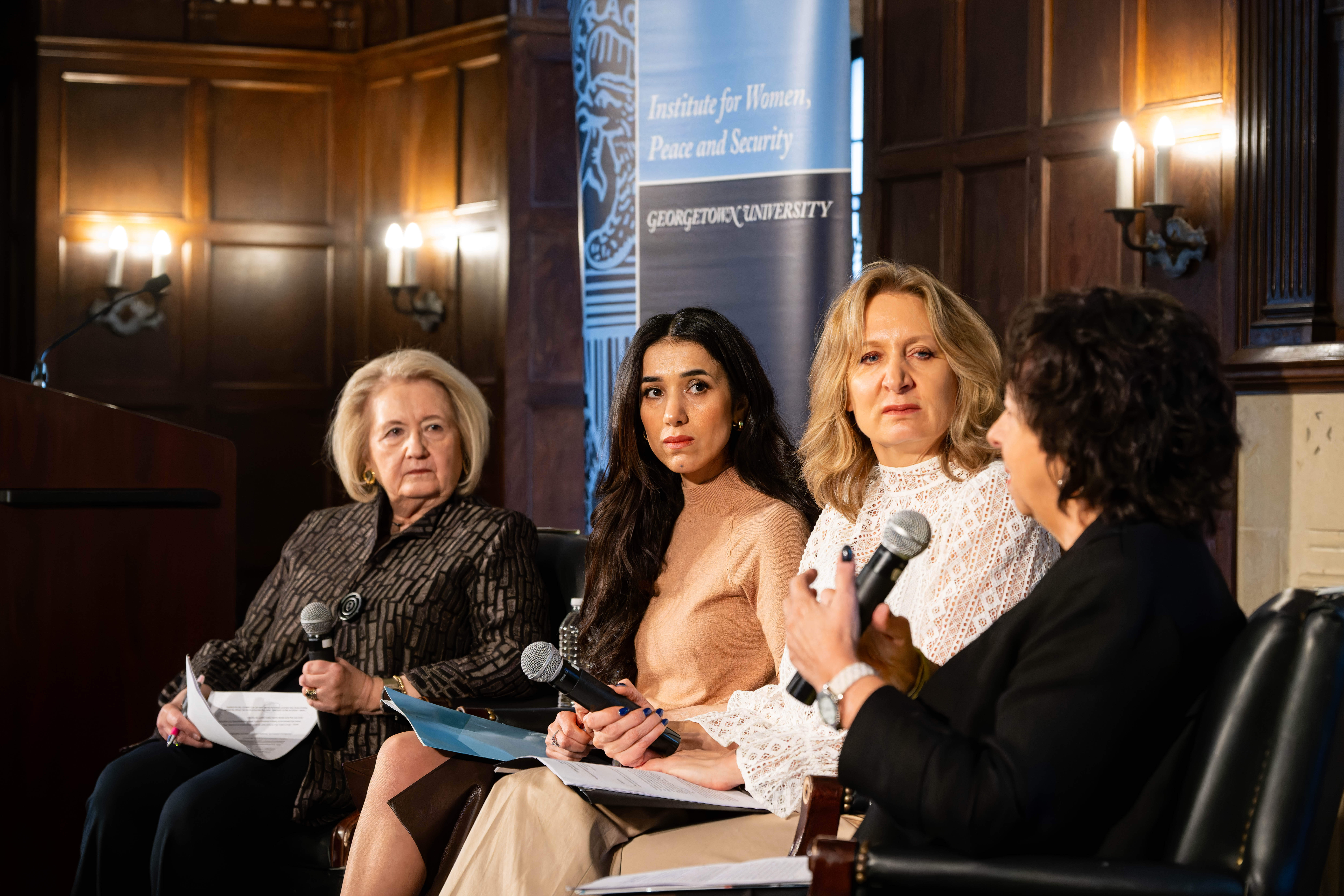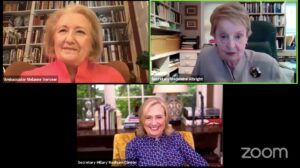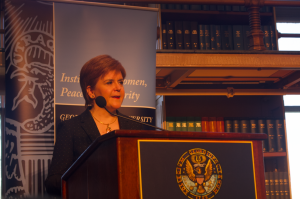Content warning: mentions of sexual violence
On Jan. 31 the Georgetown Institute for Women, Peace, and Security (GIWPS) mourned and commemorated the 10-year anniversary of the Yazidi genocide committed by ISIS with a panel titled “Rebuilding After Atrocities: Accountability and Reconstruction in Sinjar and Beyond.”
Hosted at the Copley Formal Lounge, the event highlighted the recently released status report on Sinjar, a city in Northern Iraq, titled “Rebuilding Amid the Ruins” developed by Nadia’s Initiative in collaboration with GIWPS. Through a survivor-led approach, Nadia’s Initiative works to restore and improve the Sinjar community by empowering women, preserving culture, and improving living standards.
The panelists included U.S. Ambassador-At-Large for Global Criminal Justice Beth Van Schaack, Georgetown Law’s Human Rights Institute Executive Director Elisa Massimino, GIWPS Executive Director Melanne Verveer, and Nobel Peace Prize Laureate Nadia Murad. They discussed the ongoing challenges faced by post-conflict regions worldwide, with particular emphasis on the restoration of Sinjar – Murad’s home.
ISIS perpetrated the Yazidi genocide in 2014 by invading the Sinjar region of Iraq, displacing over 400,000 members of the Kurdish-speaking ethno-religious group known as Yazidis. ISIS murdered over 5,000 Yazidi people and enslaved more than 6,000 women and children.
GIWPS Executive Director and former U.S. Ambassador-at-large for Global Women’s Issues Melanne Vermeer gave the opening remarks. Verveer emphasized that conflict-related sexual violence and mass atrocities, as well as their long-term impacts, continue to affect people all over the world.
“Over half of those displaced by the violence, however, have not returned home, and those that have returned, as you will hear today, are struggling,” Verveer said.
Before the panel began, Nadia Murad, a survivor of the Yazidi genocide and advocate for women’s rights, spoke about her personal experience surviving the genocide and her efforts to rebuild her home in the aftermath. She aimed to bring a message of hope: that post-conflict regions cannot only survive, but can thrive once again.
As Murad emphasized, the Yazidis have not only been attacked in 2014, but 74 times throughout history.
“Our ancestors stayed and rebuilt, and so can we,” she said.
Murad emphasized the poor conditions found in refugee camps in recovering areas like Sinjar. She cited a lack of education, healthcare, and private spaces available to survivors so that they can safely heal. To her, the most startling problem in the refugee camps was the lack of purpose refugees felt in their lives. Without access to jobs or the ability to meet their basic needs, the refugees, in particular the women who have little agency, have no distraction from their trauma and lose hope of a better future, Murad said.
Nadia’s Initiative, founded by Murad, aims to rebuild the infrastructure of communities so that genocide and sexual violence survivors can find purpose once again. The organization provides women access to reparations, professional courses, and education, aiming to reduce poverty and inequality.
“We are building our community from the ground up, giving survivors the tools they need for decades rather than days,” Murad said.
Challenges persist, particularly in scaling efforts and securing resources – as funding has been scarce. As families slowly return to Sinjar after being scattered in refugee camps abroad, Murad called on the Iraqi government to provide the necessary infrastructure and justice.
The panelists also discussed legal avenues, such as the first Yazidi genocide prosecution in Germany, and organizations like Yazda and UNITAD that work to hold perpetrators accountable. Van Schaack and Verveer emphasized, however, it is not a scarcity of options but a lack of political will to pursue them that has hindered justice.
“It is ultimately Iraq’s responsibility as the nationality state to deliver justice,” Van Schaack said.
Murad expressed her personal worries that the Iraqi government will not ensure justice for the Yazidi people, especially since she said it has not yet recognized the genocide or the sexual violence related to it. As a result, Van Schaack and Murad both worry the genocide of the Yazidi people will be forgotten and justice will not be served.
Georgetown students were urged to contribute to these global challenges, with Massimino highlighting an experimental learning course, Human Rights Advocacy in Action Practicum, that worked alongside Murad and her organization to support their advocacy efforts.
“We need to be constantly feeding new energy into the fight,” Massimino said.
Verveer emphasized the power of students, as Murad mentioned, in advocating for accountability in international conflicts. In an interview with the Voice after the event, Verveer stressed the impact of student voices, stating, “There is no telling what we can do.”
Georgetown students who were present at the event described feeling a renewed sense of purpose in their studies.
“It’s very grounding, and it reminds you why you’re reading and why you’re going to school for what you are,” Grace Luloff (MA ‘24) said.
“When you’re talking about prevention in terms of atrocities, it’s really important to empathize and see the people that are affected today,” Kaitlyn Pastino (MSFS ‘25) said. She urged her peers to take time out of their busy schedules to come and hear stories like Murad’s.
Murad’s ending remarks exemplified the call to action and collective responsibility ahead.
“If we don’t work together and support each other, I don’t think future generations will forgive us.”






Very insightful. Well written.